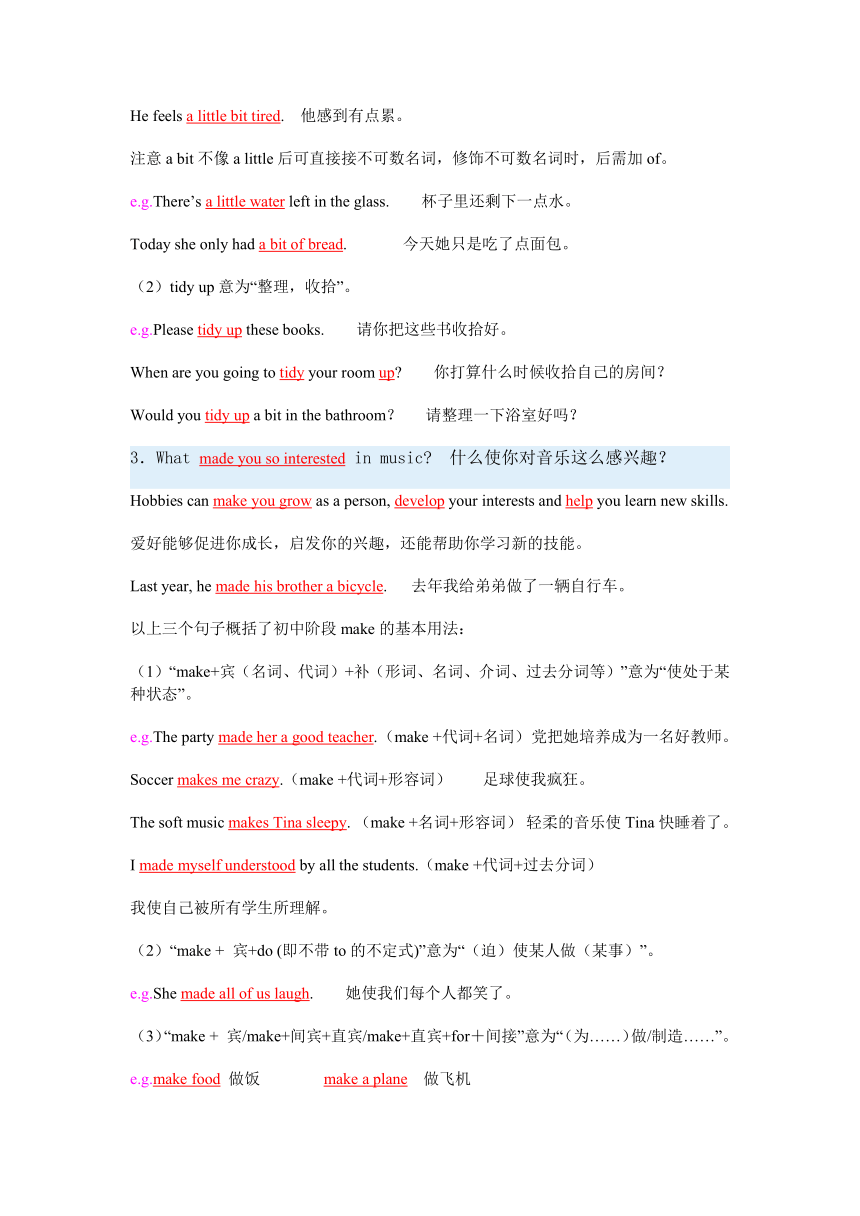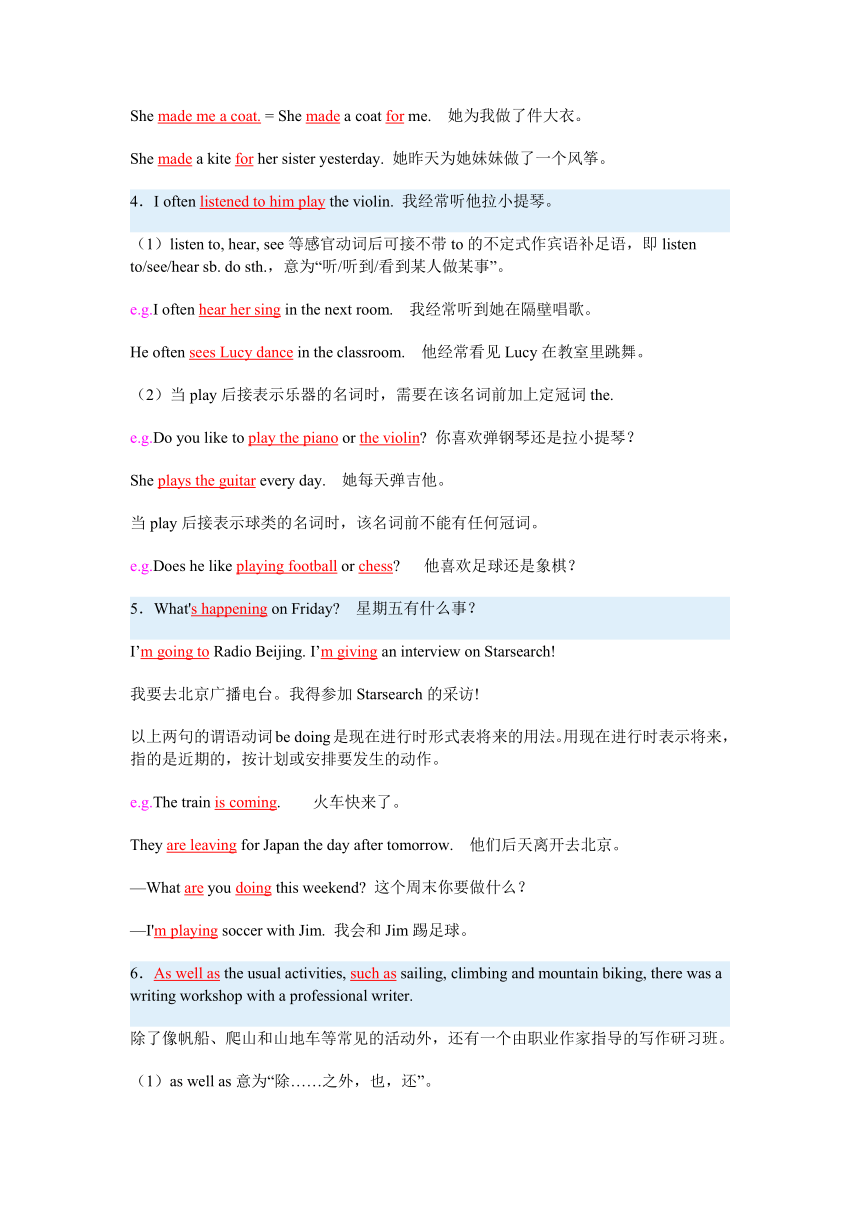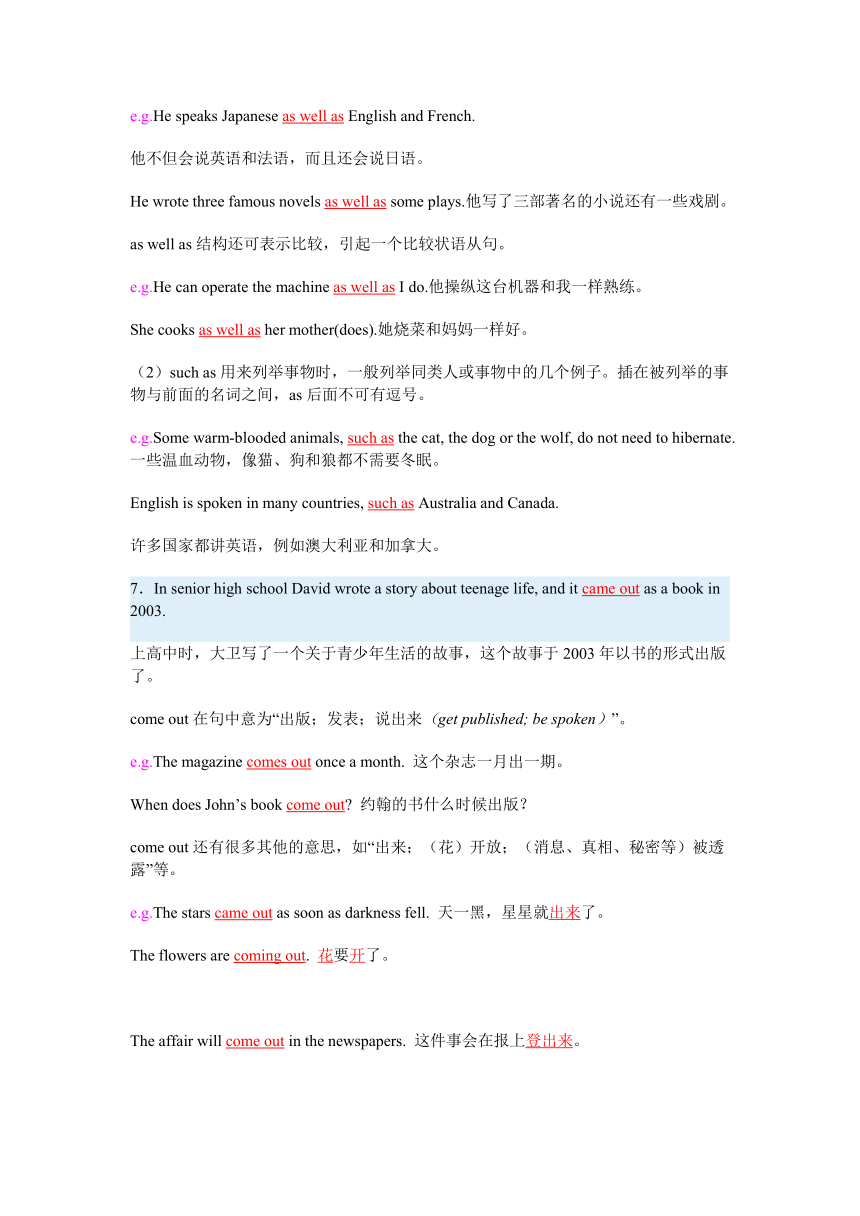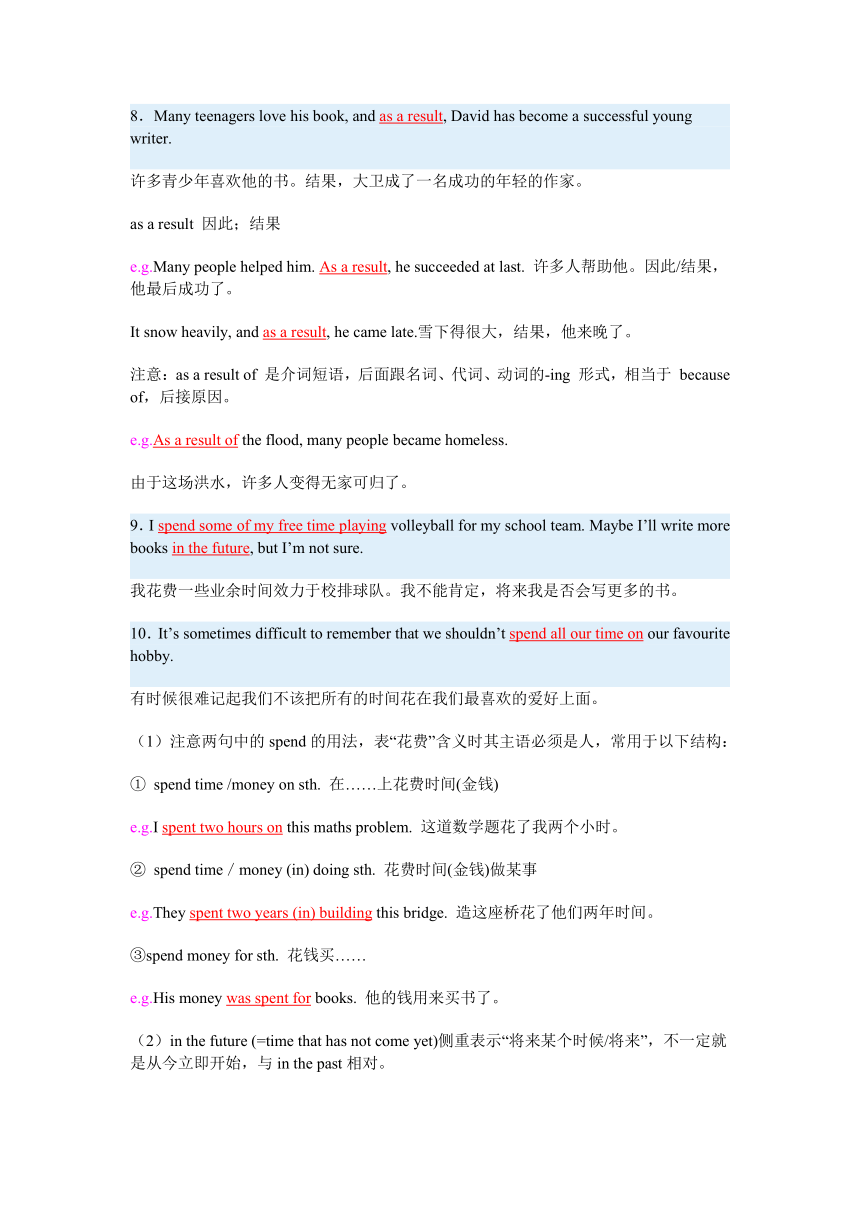八年级下>Module 1 Hobbies>本模块综合与测试
文档属性
| 名称 | 八年级下>Module 1 Hobbies>本模块综合与测试 |

|
|
| 格式 | zip | ||
| 文件大小 | 25.0KB | ||
| 资源类型 | 教案 | ||
| 版本资源 | 外研版 | ||
| 科目 | 英语 | ||
| 更新时间 | 2013-05-21 08:10:13 | ||
图片预览





文档简介
Module 1 Hobbies
一、一周知识概述
1.谈论自己的爱好。
2.重点单词及短语:collect, tidy, fan, interview, volleyball, useful, activity, develop, result; tidy up, take up, all the time, be interested in, as well as, such as, as a result, come out, listen to sb. to do, make +宾语+宾补, spend time in doing sth, spend time on sth., in the future等。
3.语法:掌握简单句的基本句型(SV, SVO, SLP, SVOiOd, SVOC)并会划分简单句的成分。
二、重难点知识讲解
1.Which hobby do you think takes up the least space
你认为哪种爱好占地方最少?
take up在句中意为“填满,占据(某空间或时间)”。
e.g.This table takes up too much room. 这张桌子太占地方。
Her time is fully taken up with writing. 她的时间都用于写作了。
take up还有“开始从事;专注于继续;接下去”的意思。
e.g.He took up art at school. 他在学校开始对艺术感到兴趣。
to take up one’s story 接着讲故事
2.Sorry it’s a bit untidy. I’ll tidy up the table and chairs.
对不起,有点乱。我会收拾一下桌椅的。
(1)a bit表示“稍微、一点儿”,可以修饰动词以及形容词、副词的原级、比较级。
e.g.After a day’s work, I’m a bit tired. 工作一天之后,我有点儿累。
Can you speak a bit more slowly 你能说得稍微慢一点吗?
This is a bit more expensive than that. 这个比那个略微贵一点。
a little bit意为“有点儿;一点儿”,常用于口语中,与a little和a bit意思相近,用来修饰形容词。
He feels a little bit tired. 他感到有点累。
注意a bit不像a little后可直接接不可数名词,修饰不可数名词时,后需加of。
e.g.There’s a little water left in the glass. 杯子里还剩下一点水。
Today she only had a bit of bread. 今天她只是吃了点面包。
(2)tidy up意为“整理,收拾”。
e.g.Please tidy up these books. 请你把这些书收拾好。
When are you going to tidy your room up 你打算什么时候收拾自己的房间?
Would you tidy up a bit in the bathroom? 请整理一下浴室好吗?
3.What made you so interested in music 什么使你对音乐这么感兴趣?
Hobbies can make you grow as a person, develop your interests and help you learn new skills.
爱好能够促进你成长,启发你的兴趣,还能帮助你学习新的技能。
Last year, he made his brother a bicycle. 去年我给弟弟做了一辆自行车。
以上三个句子概括了初中阶段make的基本用法:
(1)“make+宾(名词、代词)+补(形词、名词、介词、过去分词等)”意为“使处于某种状态”。
e.g.The party made her a good teacher. (make +代词+名词) 党把她培养成为一名好教师。
Soccer makes me crazy.(make +代词+形容词) 足球使我疯狂。
The soft music makes Tina sleepy. (make +名词+形容词) 轻柔的音乐使Tina快睡着了。
I made myself understood by all the students.(make +代词+过去分词)
我使自己被所有学生所理解。
(2)“make + 宾+do (即不带to的不定式)”意为“(迫)使某人做(某事)”。
e.g.She made all of us laugh. 她使我们每个人都笑了。
(3)“make + 宾/make+间宾+直宾/make+直宾+for+间接”意为“(为……)做/制造……”。
e.g.make food 做饭 make a plane 做飞机
She made me a coat. = She made a coat for me. 她为我做了件大衣。
She made a kite for her sister yesterday. 她昨天为她妹妹做了一个风筝。
4.I often listened to him play the violin. 我经常听他拉小提琴。
(1)listen to, hear, see等感官动词后可接不带to的不定式作宾语补足语,即listen to/see/hear sb. do sth.,意为“听/听到/看到某人做某事”。
e.g.I often hear her sing in the next room. 我经常听到她在隔壁唱歌。
He often sees Lucy dance in the classroom. 他经常看见Lucy在教室里跳舞。
(2)当play后接表示乐器的名词时,需要在该名词前加上定冠词the.
e.g.Do you like to play the piano or the violin 你喜欢弹钢琴还是拉小提琴?
She plays the guitar every day. 她每天弹吉他。
当play后接表示球类的名词时,该名词前不能有任何冠词。
e.g.Does he like playing football or chess 他喜欢足球还是象棋?
5.What's happening on Friday 星期五有什么事?
I’m going to Radio Beijing. I’m giving an interview on Starsearch!
我要去北京广播电台。我得参加Starsearch的采访!
以上两句的谓语动词be doing是现在进行时形式表将来的用法。用现在进行时表示将来,指的是近期的,按计划或安排要发生的动作。
e.g.The train is coming. 火车快来了。
They are leaving for Japan the day after tomorrow. 他们后天离开去北京。
—What are you doing this weekend 这个周末你要做什么?
—I'm playing soccer with Jim. 我会和Jim踢足球。
6.As well as the usual activities, such as sailing, climbing and mountain biking, there was a writing workshop with a professional writer.
除了像帆船、爬山和山地车等常见的活动外,还有一个由职业作家指导的写作研习班。
(1)as well as意为“除……之外,也,还”。
e.g.He speaks Japanese as well as English and French.
他不但会说英语和法语,而且还会说日语。
He wrote three famous novels as well as some plays.他写了三部著名的小说还有一些戏剧。
as well as结构还可表示比较,引起一个比较状语从句。
e.g.He can operate the machine as well as I do.他操纵这台机器和我一样熟练。
She cooks as well as her mother(does).她烧菜和妈妈一样好。
(2)such as用来列举事物时,一般列举同类人或事物中的几个例子。插在被列举的事物与前面的名词之间,as后面不可有逗号。
e.g.Some warm-blooded animals, such as the cat, the dog or the wolf, do not need to hibernate. 一些温血动物,像猫、狗和狼都不需要冬眠。
English is spoken in many countries, such as Australia and Canada.
许多国家都讲英语,例如澳大利亚和加拿大。
7.In senior high school David wrote a story about teenage life, and it came out as a book in 2003.
上高中时,大卫写了一个关于青少年生活的故事,这个故事于2003年以书的形式出版了。
come out在句中意为“出版;发表;说出来(get published; be spoken)”。
e.g.The magazine comes out once a month. 这个杂志一月出一期。
When does John’s book come out 约翰的书什么时候出版?
come out还有很多其他的意思,如“出来;(花)开放;(消息、真相、秘密等)被透露”等。
e.g.The stars came out as soon as darkness fell. 天一黑,星星就出来了。
The flowers are coming out. 花要开了。
The affair will come out in the newspapers. 这件事会在报上登出来。
8.Many teenagers love his book, and as a result, David has become a successful young writer.
许多青少年喜欢他的书。结果,大卫成了一名成功的年轻的作家。
as a result 因此;结果
e.g.Many people helped him. As a result, he succeeded at last. 许多人帮助他。因此/结果,他最后成功了。
It snow heavily, and as a result, he came late.雪下得很大,结果,他来晚了。
注意:as a result of 是介词短语,后面跟名词、代词、动词的-ing 形式,相当于 because of,后接原因。
e.g.As a result of the flood, many people became homeless.
由于这场洪水,许多人变得无家可归了。
9.I spend some of my free time playing volleyball for my school team. Maybe I’ll write more books in the future, but I’m not sure.
我花费一些业余时间效力于校排球队。我不能肯定,将来我是否会写更多的书。
10.It’s sometimes difficult to remember that we shouldn’t spend all our time on our favourite hobby.
有时候很难记起我们不该把所有的时间花在我们最喜欢的爱好上面。
(1)注意两句中的spend的用法,表“花费”含义时其主语必须是人,常用于以下结构:
① spend time /money on sth. 在……上花费时间(金钱)
e.g.I spent two hours on this maths problem. 这道数学题花了我两个小时。
② spend time/money (in) doing sth. 花费时间(金钱)做某事
e.g.They spent two years (in) building this bridge. 造这座桥花了他们两年时间。
③spend money for sth. 花钱买……
e.g.His money was spent for books. 他的钱用来买书了。
(2)in the future (=time that has not come yet)侧重表示“将来某个时候/将来”,不一定就是从今立即开始,与in the past相对。
e.g.My sister wants to be an actress in the future. 我妹妹将来想当演员。
注意:in future(= from now on)也是“在将来”的含义,它强调“从今以后/今后”。
e.g.Don’t do that again. Be more careful in future.别再那样做了,今后更要注意。
三、语法点拨——简单句基本句型
英语是一种结构型的语言,以谓语动词为核心构成的各种句型。为了帮助同学们掌握英语的句型,本模块我们一起总结英语简单句的基本句型。所谓简单句,就是整个句子由一个主语(或并列主语)和一个谓语(或并列谓语)构成。简单句常见的基本句型有以下五种:
(一)主语+不及物动词(Subject+Intransitive Verb)(SV)
例句:They are running.他们在跑步。
剖析:在此句中,谓语动词是不及物动词,不必加宾语就可表达一个完整的、明确无误的意思。有时为了表示动作发生的频率、原因、结果、目的、场所、时间等,可以带状语修饰动词,但状语不算句子的主要成分。例如:
The students are playing under the tree. 学生们正在树下玩耍。
句中the students是主语,are playing是谓语动词,介词短语under the tree作地点状语,修饰动词,说明动作发生的地点,但不是句子的主要成分。
常见的不及物动词有:come, go, listen, wait, climb, move, jump, laugh, sit, stay等。
(二)主语+及物动词+宾语(Subject+Transitive Verb+Object)(SVO)
例句:We read English every morning.我们每天早晨读英语。
剖析:此句型的谓语动词是及物动词。因此,必须后跟宾语,才能使句意表达完整、准确。宾语是谓语动词动作行为的对象,由名词、代词或相当于名词的词或短语等充当。
e.g.My sister likes bread .我妹妹喜欢吃面包。
I finished reading the book.我读完了这本书。
Would you like to come?你愿意来吗?
常见的及物动词有:like, finish, enjoy, want, play, make, help, take, read, tell, teach, do等。
(三)主语+连系动词+表语(Subject+Link Verb+Predicative)(SLP)
例句:They are English teachers. 他们是英语教师。
The days get longer. 白天变长了。
剖析:此类句型的谓语动词是连系动词,它本身有一定的涵义,但不能独立作谓语,它必须和表语一起构成谓语。表语通常由名词、形容词或相当于名词或形容词的词或短语充当,说明主语是什么或怎么样。
e.g.My book is on the desk. 我的书在桌子上。(句中on the desk这一介词短语作表语)
The trees turn green in spring. 树木在春天变绿。(The trees是主语,turn是连系动词,green是形容词作表语,in spring是时间状语)
常见的连系动词有:be动词, 感官动词feel(感觉), look(看起来), 以及表示变化的动词get(变得), turn(变成), become(成为), go(变成)等。
(四)主语+及物动词+间接宾语+直接宾语(Subject+Verb +Indirect Object+Direct Object)(SVOiOd)
例句:He told me a story yesterday.他昨天给我讲了个故事。
剖析:在这类句型中,谓语动词要带两个宾语,即直接宾语和间接宾语,所以该句型也称为:主语+及物动词+双宾语。在该句型中,间接宾语为及物动词这个动作所涉及到的人(如上句中的me),直接宾语指及物动词这个动作的直接对象(如上句中的a story)。
e.g.Could you pass me the salt?请你将盐递给我,好吗?
间接宾语有时也可以改成一个由 to或for引起的短语,放在直接宾语之后,即构成“主语+及物动词+直接宾语+介词+间接宾语”的句式。
e.g.Uncle Wang made the farmers many machines.
王叔叔给那些农民制造了很多机器。
=Uncle Wang made many machines for the farmers.
Could you show us your dictionary?
你能把你的字典给我们看吗?
=Could you show your dictionary to us?
用to还是用for取决于动词,一般常在give, show, pass, send, teach等动词后用介词to, 而在buy, sing, make, draw, cook等动词后用介词for。
在此句型中,如果直接宾语为人称代词宾格时,则只能使用“主语+及物动词+直接宾语+介词+间接宾语”的表达形式。
e.g.I’ll show it to my brother. 我将把它给我的弟弟看。
(五)主语+及物动词+宾语+宾语补足语(Subject+Verb+Object+Complement)(SVOC)
例句:We will keep the table clean. 我们将保持桌面干净。
剖析:有些及物动词的宾语后边还需要有一个补足语作以补充说明,意思才完整。宾补的作用是说明宾语的动作或状态,宾语和它的补足语构成复合宾语。例如:
They called him James. 他们叫他詹姆斯。
在动词宾语后面跟着的是直接宾语还是宾语补足语,可由前面的宾语与其关系来判断:若宾语与其后的部分不存在逻辑上的主谓关系,则该动词后跟的是双宾语;若宾语和其后的部分有逻辑上的主谓关系,则该动词后跟的是复合宾语。试比较:
Mother will cook us something English this evening.妈妈今晚将为我们做些英国食物。
(us和something不存在主谓关系,此处为双宾语结构)
We call that boy Tom. 我们叫那个男孩汤姆。
(That boy is Tom.合乎逻辑,即宾语that boy与Tom存在主谓关系,故此处为复合宾语结构)
宾语补足语可以由名词、动词不定式、形容词、副词和介词短语等充当。在感官动词see, hear, watch, look at, listen to, feel, notice等及使役动词make, let, have等后跟动词不定式作宾语补足语时,该不定式符号to应省去。
e.g.We often hear her sing songs in her room.我们经常听见她在房间里唱歌。
窗体顶端
单项选择:
1.Lucy prefers _____ basketball to playing ________.
A.to play; violin B.played; violin
C.playing; the violin D.play; the violin
2.Steven is so lucky that he has got almost everything, such as fortune, fame ____.
A.and love B.and so onC.etc. D.and so forth
3.— Excuse me. How can I get to the nearest bank
— Sorry, I’m new here. — ___________.
A.Bad luck B.That's true
C.Thank you all the same D.Not at all
4.John plays football ____, if not better than, David.
A.as well B.as well asC.so well D.so well as
5.My uncle lives ____ 105 Beijing Street.
A.on B.atC.to D.of
6.Most middle school students spend much time _________ TV every day.
A.to watch B.watchedC.watching D.watch
7.This book is very ________. I am _________ in it.
A.interested, interested B.interested, interesting
C.interesting, interesting D.interesting, interested
8.You don’t like to do your homework. What about _________ soccer
A.to play B.playedC.playing D.play
9.Ren Changxia, a policeman, was always very busy. She had little time to spend __________ her family.
A.about B.onC.with D.in
10.It is _________ hot. Let’s have a rest under the tree.
A.a little B.littleC.a few D.few
11.They knew her very well. They had seen her ___ up from childhood.
A.grow B.grewC.was growing D.to grow
12.The whole family _______ to Guangzhou for holidays tomorrow.
A.is going B.are goingC.goes D.went
窗体底端
一、根据句意或首字母完成单词。
1.My brother likes c stamps.
2.What made you so i in music
3.Tom is a l (懒惰的) boy. He doesn’t study hard.
4.The table t up too much room.
5.I can’t i (想象) what he looks like.
6.Too many a (活动) take up too much of our time for study.
7.Your room is in a mess. Please t up your room.
8.I thank you very much indeed for this i (接见/采访).
二、翻译下列短语。
1.占据 2.收拾某人的房间
3.集邮 4.对……感兴趣
5.拉小提琴 6.给某人某物
7.这个学期末 8.将来
9.听音乐 10.使某人做某事
11.结果 12.例如
13.出版 14.花时间/金钱做某事
15.照顾,照料 16.拍照
答案:1-5 CACBB 6-12 CDCCAAB
答案: 1.collecting 2.interested
3.lazy 4.takes
5.imagine 6.activities
7.tidy 8.interview
答案:
1.take up 2.tidy up one’s room 3.collect stamps 4.be interested in
5.play the violin 6.give sb. sth./give sth. to sb.7.at the end of this term
8.in the future 9.listen to music10.make sb. do 11.as a result
12.such as 13.come out 14.spend time/money in doing sth. 15.look after
16.take photos
一、一周知识概述
1.谈论自己的爱好。
2.重点单词及短语:collect, tidy, fan, interview, volleyball, useful, activity, develop, result; tidy up, take up, all the time, be interested in, as well as, such as, as a result, come out, listen to sb. to do, make +宾语+宾补, spend time in doing sth, spend time on sth., in the future等。
3.语法:掌握简单句的基本句型(SV, SVO, SLP, SVOiOd, SVOC)并会划分简单句的成分。
二、重难点知识讲解
1.Which hobby do you think takes up the least space
你认为哪种爱好占地方最少?
take up在句中意为“填满,占据(某空间或时间)”。
e.g.This table takes up too much room. 这张桌子太占地方。
Her time is fully taken up with writing. 她的时间都用于写作了。
take up还有“开始从事;专注于继续;接下去”的意思。
e.g.He took up art at school. 他在学校开始对艺术感到兴趣。
to take up one’s story 接着讲故事
2.Sorry it’s a bit untidy. I’ll tidy up the table and chairs.
对不起,有点乱。我会收拾一下桌椅的。
(1)a bit表示“稍微、一点儿”,可以修饰动词以及形容词、副词的原级、比较级。
e.g.After a day’s work, I’m a bit tired. 工作一天之后,我有点儿累。
Can you speak a bit more slowly 你能说得稍微慢一点吗?
This is a bit more expensive than that. 这个比那个略微贵一点。
a little bit意为“有点儿;一点儿”,常用于口语中,与a little和a bit意思相近,用来修饰形容词。
He feels a little bit tired. 他感到有点累。
注意a bit不像a little后可直接接不可数名词,修饰不可数名词时,后需加of。
e.g.There’s a little water left in the glass. 杯子里还剩下一点水。
Today she only had a bit of bread. 今天她只是吃了点面包。
(2)tidy up意为“整理,收拾”。
e.g.Please tidy up these books. 请你把这些书收拾好。
When are you going to tidy your room up 你打算什么时候收拾自己的房间?
Would you tidy up a bit in the bathroom? 请整理一下浴室好吗?
3.What made you so interested in music 什么使你对音乐这么感兴趣?
Hobbies can make you grow as a person, develop your interests and help you learn new skills.
爱好能够促进你成长,启发你的兴趣,还能帮助你学习新的技能。
Last year, he made his brother a bicycle. 去年我给弟弟做了一辆自行车。
以上三个句子概括了初中阶段make的基本用法:
(1)“make+宾(名词、代词)+补(形词、名词、介词、过去分词等)”意为“使处于某种状态”。
e.g.The party made her a good teacher. (make +代词+名词) 党把她培养成为一名好教师。
Soccer makes me crazy.(make +代词+形容词) 足球使我疯狂。
The soft music makes Tina sleepy. (make +名词+形容词) 轻柔的音乐使Tina快睡着了。
I made myself understood by all the students.(make +代词+过去分词)
我使自己被所有学生所理解。
(2)“make + 宾+do (即不带to的不定式)”意为“(迫)使某人做(某事)”。
e.g.She made all of us laugh. 她使我们每个人都笑了。
(3)“make + 宾/make+间宾+直宾/make+直宾+for+间接”意为“(为……)做/制造……”。
e.g.make food 做饭 make a plane 做飞机
She made me a coat. = She made a coat for me. 她为我做了件大衣。
She made a kite for her sister yesterday. 她昨天为她妹妹做了一个风筝。
4.I often listened to him play the violin. 我经常听他拉小提琴。
(1)listen to, hear, see等感官动词后可接不带to的不定式作宾语补足语,即listen to/see/hear sb. do sth.,意为“听/听到/看到某人做某事”。
e.g.I often hear her sing in the next room. 我经常听到她在隔壁唱歌。
He often sees Lucy dance in the classroom. 他经常看见Lucy在教室里跳舞。
(2)当play后接表示乐器的名词时,需要在该名词前加上定冠词the.
e.g.Do you like to play the piano or the violin 你喜欢弹钢琴还是拉小提琴?
She plays the guitar every day. 她每天弹吉他。
当play后接表示球类的名词时,该名词前不能有任何冠词。
e.g.Does he like playing football or chess 他喜欢足球还是象棋?
5.What's happening on Friday 星期五有什么事?
I’m going to Radio Beijing. I’m giving an interview on Starsearch!
我要去北京广播电台。我得参加Starsearch的采访!
以上两句的谓语动词be doing是现在进行时形式表将来的用法。用现在进行时表示将来,指的是近期的,按计划或安排要发生的动作。
e.g.The train is coming. 火车快来了。
They are leaving for Japan the day after tomorrow. 他们后天离开去北京。
—What are you doing this weekend 这个周末你要做什么?
—I'm playing soccer with Jim. 我会和Jim踢足球。
6.As well as the usual activities, such as sailing, climbing and mountain biking, there was a writing workshop with a professional writer.
除了像帆船、爬山和山地车等常见的活动外,还有一个由职业作家指导的写作研习班。
(1)as well as意为“除……之外,也,还”。
e.g.He speaks Japanese as well as English and French.
他不但会说英语和法语,而且还会说日语。
He wrote three famous novels as well as some plays.他写了三部著名的小说还有一些戏剧。
as well as结构还可表示比较,引起一个比较状语从句。
e.g.He can operate the machine as well as I do.他操纵这台机器和我一样熟练。
She cooks as well as her mother(does).她烧菜和妈妈一样好。
(2)such as用来列举事物时,一般列举同类人或事物中的几个例子。插在被列举的事物与前面的名词之间,as后面不可有逗号。
e.g.Some warm-blooded animals, such as the cat, the dog or the wolf, do not need to hibernate. 一些温血动物,像猫、狗和狼都不需要冬眠。
English is spoken in many countries, such as Australia and Canada.
许多国家都讲英语,例如澳大利亚和加拿大。
7.In senior high school David wrote a story about teenage life, and it came out as a book in 2003.
上高中时,大卫写了一个关于青少年生活的故事,这个故事于2003年以书的形式出版了。
come out在句中意为“出版;发表;说出来(get published; be spoken)”。
e.g.The magazine comes out once a month. 这个杂志一月出一期。
When does John’s book come out 约翰的书什么时候出版?
come out还有很多其他的意思,如“出来;(花)开放;(消息、真相、秘密等)被透露”等。
e.g.The stars came out as soon as darkness fell. 天一黑,星星就出来了。
The flowers are coming out. 花要开了。
The affair will come out in the newspapers. 这件事会在报上登出来。
8.Many teenagers love his book, and as a result, David has become a successful young writer.
许多青少年喜欢他的书。结果,大卫成了一名成功的年轻的作家。
as a result 因此;结果
e.g.Many people helped him. As a result, he succeeded at last. 许多人帮助他。因此/结果,他最后成功了。
It snow heavily, and as a result, he came late.雪下得很大,结果,他来晚了。
注意:as a result of 是介词短语,后面跟名词、代词、动词的-ing 形式,相当于 because of,后接原因。
e.g.As a result of the flood, many people became homeless.
由于这场洪水,许多人变得无家可归了。
9.I spend some of my free time playing volleyball for my school team. Maybe I’ll write more books in the future, but I’m not sure.
我花费一些业余时间效力于校排球队。我不能肯定,将来我是否会写更多的书。
10.It’s sometimes difficult to remember that we shouldn’t spend all our time on our favourite hobby.
有时候很难记起我们不该把所有的时间花在我们最喜欢的爱好上面。
(1)注意两句中的spend的用法,表“花费”含义时其主语必须是人,常用于以下结构:
① spend time /money on sth. 在……上花费时间(金钱)
e.g.I spent two hours on this maths problem. 这道数学题花了我两个小时。
② spend time/money (in) doing sth. 花费时间(金钱)做某事
e.g.They spent two years (in) building this bridge. 造这座桥花了他们两年时间。
③spend money for sth. 花钱买……
e.g.His money was spent for books. 他的钱用来买书了。
(2)in the future (=time that has not come yet)侧重表示“将来某个时候/将来”,不一定就是从今立即开始,与in the past相对。
e.g.My sister wants to be an actress in the future. 我妹妹将来想当演员。
注意:in future(= from now on)也是“在将来”的含义,它强调“从今以后/今后”。
e.g.Don’t do that again. Be more careful in future.别再那样做了,今后更要注意。
三、语法点拨——简单句基本句型
英语是一种结构型的语言,以谓语动词为核心构成的各种句型。为了帮助同学们掌握英语的句型,本模块我们一起总结英语简单句的基本句型。所谓简单句,就是整个句子由一个主语(或并列主语)和一个谓语(或并列谓语)构成。简单句常见的基本句型有以下五种:
(一)主语+不及物动词(Subject+Intransitive Verb)(SV)
例句:They are running.他们在跑步。
剖析:在此句中,谓语动词是不及物动词,不必加宾语就可表达一个完整的、明确无误的意思。有时为了表示动作发生的频率、原因、结果、目的、场所、时间等,可以带状语修饰动词,但状语不算句子的主要成分。例如:
The students are playing under the tree. 学生们正在树下玩耍。
句中the students是主语,are playing是谓语动词,介词短语under the tree作地点状语,修饰动词,说明动作发生的地点,但不是句子的主要成分。
常见的不及物动词有:come, go, listen, wait, climb, move, jump, laugh, sit, stay等。
(二)主语+及物动词+宾语(Subject+Transitive Verb+Object)(SVO)
例句:We read English every morning.我们每天早晨读英语。
剖析:此句型的谓语动词是及物动词。因此,必须后跟宾语,才能使句意表达完整、准确。宾语是谓语动词动作行为的对象,由名词、代词或相当于名词的词或短语等充当。
e.g.My sister likes bread .我妹妹喜欢吃面包。
I finished reading the book.我读完了这本书。
Would you like to come?你愿意来吗?
常见的及物动词有:like, finish, enjoy, want, play, make, help, take, read, tell, teach, do等。
(三)主语+连系动词+表语(Subject+Link Verb+Predicative)(SLP)
例句:They are English teachers. 他们是英语教师。
The days get longer. 白天变长了。
剖析:此类句型的谓语动词是连系动词,它本身有一定的涵义,但不能独立作谓语,它必须和表语一起构成谓语。表语通常由名词、形容词或相当于名词或形容词的词或短语充当,说明主语是什么或怎么样。
e.g.My book is on the desk. 我的书在桌子上。(句中on the desk这一介词短语作表语)
The trees turn green in spring. 树木在春天变绿。(The trees是主语,turn是连系动词,green是形容词作表语,in spring是时间状语)
常见的连系动词有:be动词, 感官动词feel(感觉), look(看起来), 以及表示变化的动词get(变得), turn(变成), become(成为), go(变成)等。
(四)主语+及物动词+间接宾语+直接宾语(Subject+Verb +Indirect Object+Direct Object)(SVOiOd)
例句:He told me a story yesterday.他昨天给我讲了个故事。
剖析:在这类句型中,谓语动词要带两个宾语,即直接宾语和间接宾语,所以该句型也称为:主语+及物动词+双宾语。在该句型中,间接宾语为及物动词这个动作所涉及到的人(如上句中的me),直接宾语指及物动词这个动作的直接对象(如上句中的a story)。
e.g.Could you pass me the salt?请你将盐递给我,好吗?
间接宾语有时也可以改成一个由 to或for引起的短语,放在直接宾语之后,即构成“主语+及物动词+直接宾语+介词+间接宾语”的句式。
e.g.Uncle Wang made the farmers many machines.
王叔叔给那些农民制造了很多机器。
=Uncle Wang made many machines for the farmers.
Could you show us your dictionary?
你能把你的字典给我们看吗?
=Could you show your dictionary to us?
用to还是用for取决于动词,一般常在give, show, pass, send, teach等动词后用介词to, 而在buy, sing, make, draw, cook等动词后用介词for。
在此句型中,如果直接宾语为人称代词宾格时,则只能使用“主语+及物动词+直接宾语+介词+间接宾语”的表达形式。
e.g.I’ll show it to my brother. 我将把它给我的弟弟看。
(五)主语+及物动词+宾语+宾语补足语(Subject+Verb+Object+Complement)(SVOC)
例句:We will keep the table clean. 我们将保持桌面干净。
剖析:有些及物动词的宾语后边还需要有一个补足语作以补充说明,意思才完整。宾补的作用是说明宾语的动作或状态,宾语和它的补足语构成复合宾语。例如:
They called him James. 他们叫他詹姆斯。
在动词宾语后面跟着的是直接宾语还是宾语补足语,可由前面的宾语与其关系来判断:若宾语与其后的部分不存在逻辑上的主谓关系,则该动词后跟的是双宾语;若宾语和其后的部分有逻辑上的主谓关系,则该动词后跟的是复合宾语。试比较:
Mother will cook us something English this evening.妈妈今晚将为我们做些英国食物。
(us和something不存在主谓关系,此处为双宾语结构)
We call that boy Tom. 我们叫那个男孩汤姆。
(That boy is Tom.合乎逻辑,即宾语that boy与Tom存在主谓关系,故此处为复合宾语结构)
宾语补足语可以由名词、动词不定式、形容词、副词和介词短语等充当。在感官动词see, hear, watch, look at, listen to, feel, notice等及使役动词make, let, have等后跟动词不定式作宾语补足语时,该不定式符号to应省去。
e.g.We often hear her sing songs in her room.我们经常听见她在房间里唱歌。
窗体顶端
单项选择:
1.Lucy prefers _____ basketball to playing ________.
A.to play; violin B.played; violin
C.playing; the violin D.play; the violin
2.Steven is so lucky that he has got almost everything, such as fortune, fame ____.
A.and love B.and so onC.etc. D.and so forth
3.— Excuse me. How can I get to the nearest bank
— Sorry, I’m new here. — ___________.
A.Bad luck B.That's true
C.Thank you all the same D.Not at all
4.John plays football ____, if not better than, David.
A.as well B.as well asC.so well D.so well as
5.My uncle lives ____ 105 Beijing Street.
A.on B.atC.to D.of
6.Most middle school students spend much time _________ TV every day.
A.to watch B.watchedC.watching D.watch
7.This book is very ________. I am _________ in it.
A.interested, interested B.interested, interesting
C.interesting, interesting D.interesting, interested
8.You don’t like to do your homework. What about _________ soccer
A.to play B.playedC.playing D.play
9.Ren Changxia, a policeman, was always very busy. She had little time to spend __________ her family.
A.about B.onC.with D.in
10.It is _________ hot. Let’s have a rest under the tree.
A.a little B.littleC.a few D.few
11.They knew her very well. They had seen her ___ up from childhood.
A.grow B.grewC.was growing D.to grow
12.The whole family _______ to Guangzhou for holidays tomorrow.
A.is going B.are goingC.goes D.went
窗体底端
一、根据句意或首字母完成单词。
1.My brother likes c stamps.
2.What made you so i in music
3.Tom is a l (懒惰的) boy. He doesn’t study hard.
4.The table t up too much room.
5.I can’t i (想象) what he looks like.
6.Too many a (活动) take up too much of our time for study.
7.Your room is in a mess. Please t up your room.
8.I thank you very much indeed for this i (接见/采访).
二、翻译下列短语。
1.占据 2.收拾某人的房间
3.集邮 4.对……感兴趣
5.拉小提琴 6.给某人某物
7.这个学期末 8.将来
9.听音乐 10.使某人做某事
11.结果 12.例如
13.出版 14.花时间/金钱做某事
15.照顾,照料 16.拍照
答案:1-5 CACBB 6-12 CDCCAAB
答案: 1.collecting 2.interested
3.lazy 4.takes
5.imagine 6.activities
7.tidy 8.interview
答案:
1.take up 2.tidy up one’s room 3.collect stamps 4.be interested in
5.play the violin 6.give sb. sth./give sth. to sb.7.at the end of this term
8.in the future 9.listen to music10.make sb. do 11.as a result
12.such as 13.come out 14.spend time/money in doing sth. 15.look after
16.take photos
同课章节目录
- Module 1 Feelings and impressions
- Unit 1 It smells delicious.
- Unit 2 I feel nervous when I speak Chinese .
- Unit 3 Language in use
- Module 2 Experiences
- Unit 1 I've also entered lots of speaking competi
- Unit 2 They have seen the Pyramids.
- Unit 3 Language in use
- Module 3 Journey to space
- Unit 1 Has it arrived yet?
- Unit 2 We have not found life on any other planet
- Unit 3 Language in use
- Module 4 Seeing the docto
- Unit 1 I haven't done much exercise since I got m
- Unit 2 We have played football for a year now
- Unit 3 Language in use
- Module 5 Cartoons
- Unit 1 It's time to watch a cartoon.
- Unit 2 Tintin has been popular for over eighty yea
- Unit 3 Language in use
- Revision module A
- Module 6 Hobbies
- Unit 1 Do you collect anything ?
- Unit 2 Hobbies can make you grow as a person.
- Unit 3 Language in use
- Module 7 Summer in Los Angeles
- Unit 1 Please write to me and send me some photos
- Unit 2 Fill out a form and come to learn English
- Unit 3 Language in use
- Module 8 Time off
- Unit 1 I can hardly believe we are in the city ce
- Unit 2 We thought somebody was moving about
- Unit 3 Language in use
- Module 9 Friendship
- Unit 1 Could I ask if you've mentioned this to he
- Unit 2 I believe that the world is what you think
- Unit 3 Language in use
- Module 10 On the radio
- Unit 1 I hope that you can join us one day
- Unit 2 It seemed that they were speaking to me in
- Unit 3 Language in use
- Revision module B
